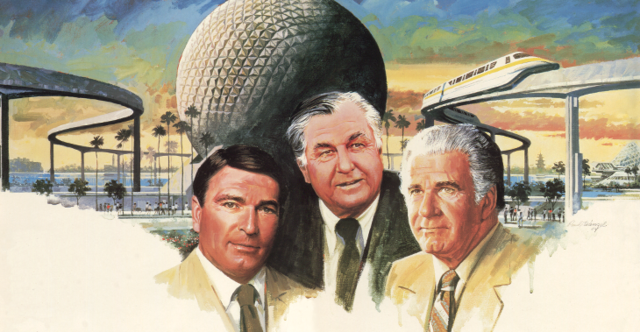I agree with you. However, I've seen some tweets and comments defending the cuts, with people trotting out the old "Disney is a business" line.
Walt Disney once said, "When I started on Disneyland, my wife used to say, 'But why do you want to build an amusement park? They're so dirty.' I told her that was just the point — mine wouldn't be."
Walt Disney took out a mortgage on his house and reportedly went $100K into personal debt to help pay for Disneyland, at a time when median household income was under $5K.
You know what?
Disney was a business in 1955 when Disneyland opened to rave reviews and financial glory.
Wanting to honor his brother's vision, the 73 year-old Roy O. Disney postponed his retirement for 5 years in order to oversee the construction of Walt Disney World, which opened in October 1971. Roy died 2 months later.
Disney was a business in 1971 when operating margin was actually
higher than what it's averaged under Bob Iger.
Struggling to find a direction for the company, Card Walker reportedly invested $1.5 billion in Epcot at a time when the
entire company's annual revenue was $1.0 billion.
Disney was a business in 1982 when this bold investment grew company revenue by 60% in 2 years.
With Disney's film industry in tatters, Roy E. Disney fronted the effort to bring in Michael Eisner, who not only managed to turn Disney into a film juggernaut but also built Disney-MGM Studios, Typhoon Lagoon, Blizzard Beach, Disney's Animal Kingdom, more than a dozen hotels, shopping districts, and a sports complex.
Disney was a business in the 1980s and 1990s when Eisner created The Walt Disney Company megacorporation and built the modern Walt Disney World.
In recent years, the Disney "business" under Bob Iger has made quality cut after quality cut, price hike on top of price hike, and project delay after project delay, turning Walt Disney World into a shell of its former glory. This in a decade that has seen company revenue grow by a paltry 5.1% annually under Iger.
No one had to explain away bad corporate behavior for Disney's
first 50 years in the theme park industry, yet for some reason the "Disney is a business" crowd thinks it's OK to trot out this tired cliché every time the Disney "business" does something to bring Walt Disney World down.

